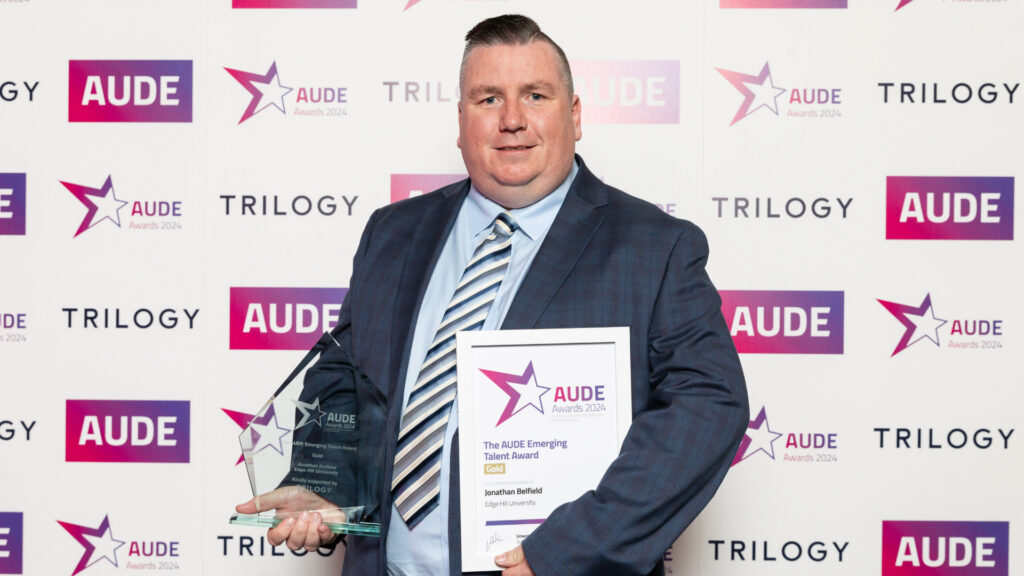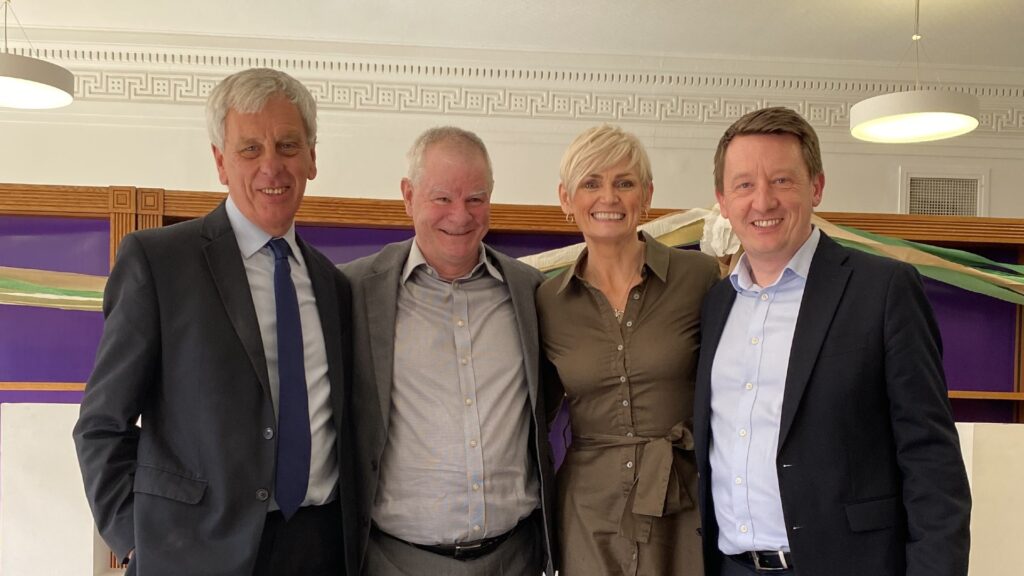
Jack Bennett is a sucker for the dark and mysterious.
There’s a mysterious door on campus. M49, it reads. What lies inside number 49? Perhaps it’s best left to the imagination. Jack’s, to be precise. It inspired a first collection of short stories by the Edge Hill English Literature and Creative Writing graduate.
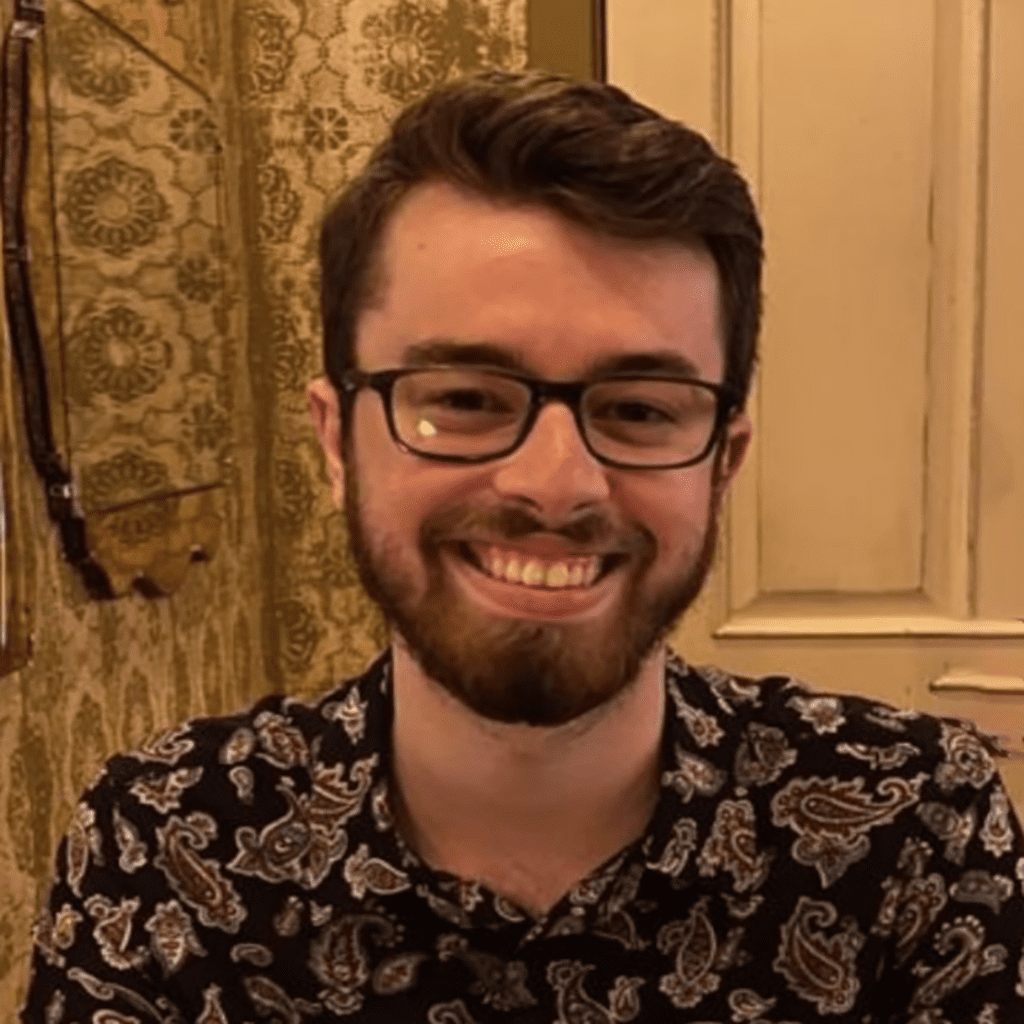
It’s the kind of question that one of Jack’s role models, Doctor Who, might find irresistible. Out with the sonic screwdriver, turn and face the strange.
Jack’s becoming familiar with the strange. He says the best advice he received was from American poet Emily Dickinson, via his poetry lecturer James Byrne: “ ‘Tell the truth but tell it slant.’ In other words, obscure your words, make the reader look at your work through a broken telescope. This helps your writing lean into the surreal.”
He certainly took it on board with his final MA manuscript. ‘Lunette’, his collection of poems, took many influences from surrealism, says Jack.
‘Vampire Bites’: Celebrating 125 years of Bram Stoker’s Dracula
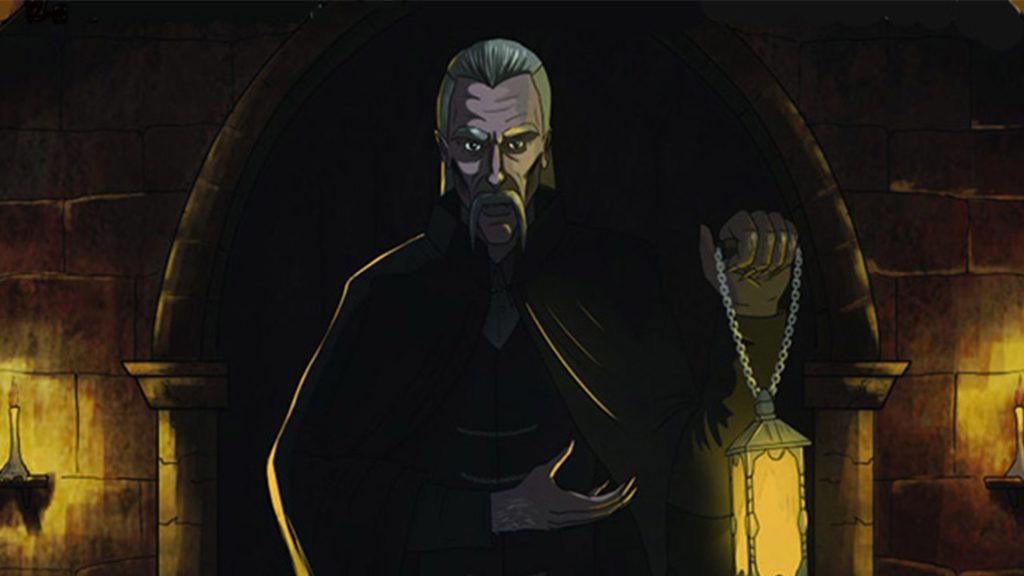
And just last year he leaned into the surreal to create a winning entry in the ‘Vampire Bites’ creative contest at the end of 2022. At a conference celebrating 125 years of Bram Stoker’s Dracula, co-organised by Dr Laura Eastlake, Senior Lecturer in English Literature at Edge Hill, students were invited to explore what the figure of the vampire means to them today. Jack got his teeth into the challenge, delivering ‘Fragments of Paole’, a companion piece to Johannes Flückinger’s 1732 medical report, Visum et Repertum, which discussed patient zero in a supposed vampiric epidemic in Serbia.
“My story explores how vampires have been associated with the changing intersections of medical and supernatural anxieties,” explains Jack. Read Jack’s winning entry.
It certainly impressed the judges, which included Bram’s great-grand-nephew Dacre Stoker who provided limited and signed edition prizes.
Lost in the Edge Hill Archives
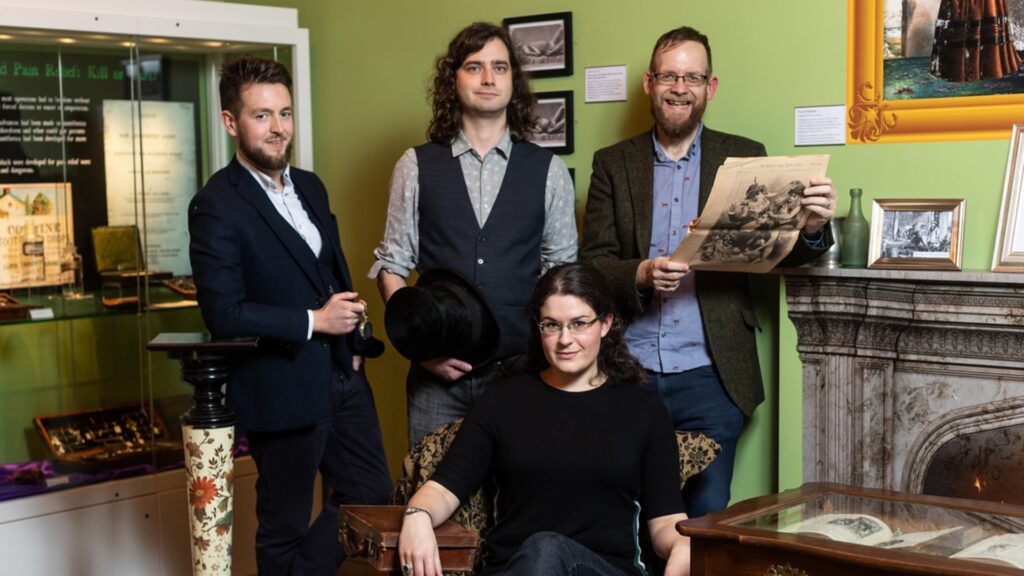
Edge Hill has a burgeoning reputation for all things Victorian. EHU Nineteen is an interdisciplinary research centre focusing on long-nineteenth century studies. Dr Bob Nicholson’s (far left) latest podcast for the BBC, Killing Victoria, investigates the stories behind Queen Victoria’s seven would-be assassins.
And continuing to seek out those hidden corners and crevices of the mind, the dark and mysterious shadowlands of the imagination, it’s fitting that Jack is currently a project assistant in the University’s reanimated archives. Jack is helping to trace Edge Hill’s academic journey, from its Victorian beginnings in 1885 as the first non-denominational teacher training college for women, with 41 students, to its current incarnation as a fully-fledged university, host to almost 10,000 full-time students.
“I research the students that trained at Edge Hill when it was a teaching college in Liverpool,” explains Jack. “I didn’t know there was an archive at the University, and I went nearly two years like that – a huge sadness! I’d urge students and staff members to visit their archive. There are so many mysteries to uncover. We’ve discovered students that were awarded MBEs, students that lived in 11 Downing Street, and others that went on to do missionary work abroad. My favourite part of the job is the feeling of excitement when people contact the archive and bring in donations.”
For Jack, having a day job doesn’t compromise his artistic ambitions. The archives are both “a place of work and a place for creative inspiration”:
“I’ve always been very aware that I’d struggle to make a living purely from writing. Unfortunately, that’s just the way it is. Luckily, I have many other interests. I make art in the form of lino-cut prints, collage, and watercolours, and the archive is somewhere I love being, both as a place of work and a place for creative inspiration. My plans for the future are to simply enjoy what I do, which I’m sure will include doing all of the above.”
Inspiring the Poetic Mind
But Jack’s primary literary medium is poetry. And ‘Lunette’, the collection of prose poems he submitted for his MA, was inspired by a lecture during his undergraduate degree.
“The most important lecture I had on my BA in English Literature and Creative Writing was on ekphrasis, which is writing on art. Ekphrastic writing is definitely my niche, and the final manuscript for my MA was poems written from Van Gogh’s Arles paintings.”
“It was written as we were re-entering the world after the lockdowns, so themes of being displaced, of purgatory, of being between states are quite prominent. It was mainly inspired by my dad’s love of canals and narrowboats, which is the setting of ‘Lunette’.”
Visiting Arles is high up on Jack’s bucket list. But why write poetry, Jack?
“There’s something quite satisfying about a poem. A good poem distils a moment, sometimes a very distressing and poignant moment, into stanzas. A poem doesn’t outstay its welcome, either. Or at least, not on a page – a good poem will stick with you long after you’ve read it!
And whose illustrious footsteps are you looking to walk in?
“My influences come from loads of places. As most of my writing is ekphrastic, the influences are usually placed on the page opposite the piece of writing they’re written after – be that a painting, a sculpture, or a photograph. ‘Cut’ by Sylvia Plath always leaves me completely stunned. The way she writes about pain, the physicality and the way pain looks, is very singular to her. Or, you know, me. If only I’d written it!”
‘Lunette’ will be published by Broken Sleep. Poetry lecturer Dr James Byrne suggested they might like it. “Thankfully, they did!” laughs Jack. On the back of this he’s taken another leap into the unknown, with his first public readings:
“I was so nervous, but the nerves fell away when I got up there. I saw it as a celebration. Poetry is to be performed, so there I was, performing mine! My second reading was at the Open Eye Gallery in Liverpool, to celebrate 100 years of TS Eliot’s ‘The Waste Land’ (talk about poems I wish I’d written…!). This was a much bigger event, much more people, in a setting I was unfamiliar with. But it was a great collaborative experience. I loved it.”
Do I need a degree to be a writer?

So would Jack have always followed a literary path, regardless of his academic route?
“First things first: No, you don’t need a degree to write. The beauty of writing is that anyone can do it. A degree sharpens the tools for writing that everyone can have. The lecturers in Creative Writing and English Lit are amazing. I always found their lectures, workshops and seminars so interesting. I’d leave thinking, ‘yeah, I chose the right course here.’ Both the English Literature and Creative Writing elements had huge influences on my writing, with the Modernisms module still having its effect on my writing today.
“So my advice to someone considering studying Creative Writing and English Lit at Edge Hill? Do it. Do it. Do it. You’ll learn so much about writing, about literature, but you’ll also learn loads about yourself, too: what you like to read and what you don’t, how to speak confidently in front of others, how to take in feedback and how to give feedback. The lecturers taught me so much.
“Analysing texts, developing opinions – and sharing those opinions in a group setting were all skills I learnt [on my degree] that have really helped my own writing – workshopping my work and developing the confidence to read it out to a group. Do it. Do it. Do it!”
And, y’know, whatever people may try and tell you, the University experience is about much, much more than getting a certificate at the end of it all:
“I really miss the people. It’s hard when you leave university and that awful realisation that you always knew was going to hit you hits you – that your mates don’t all live in Ormskirk! Or even in the North of England! Or even in England! Group chats help, of course, but it’s nothing like having everyone in that EHU bubble. Amazing memories I’ll have forever.”
“Fangs” for your memories, Jack (…and this writer will get his coat and leave by the back door).
Find out more about Creative Writing at Edge Hill University
March 28, 2023

